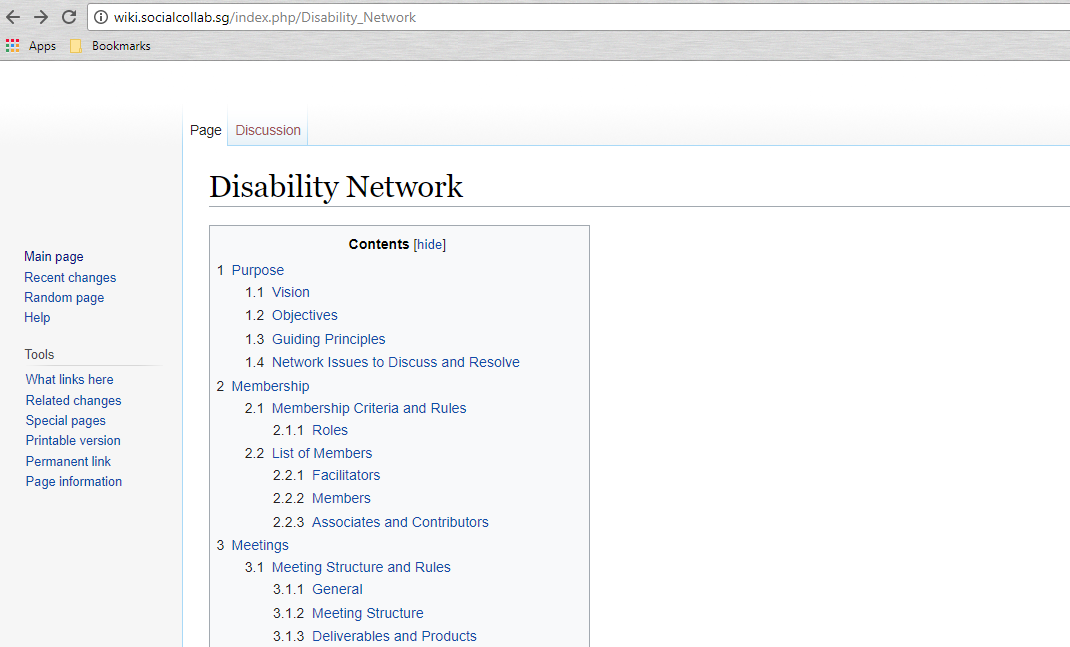IPS-DPA Roundtable on the Disability Network
By Wong Fung Shing
ON 16 OCTOBER 2017, the Institute of Policy Studies (IPS) and the Disabled People’s Association (DPA) convened a forum to discuss the design and formation of a network for and with the disability community, so that voluntary organisations and community groups interested in disability issues are able to understand the needs of their sector, define their own agenda and take collective action. Many disability organisations, voluntary welfare organisations, social enterprises, parent support groups and interested individuals have indicated their interest to be a member of the Disability Network.

The purpose of the Network is to contribute to a better collective understanding of the needs of the disability sector. It aims to be an inclusive platform to exchange views and prioritise needs, and aspires to represent the community’s view on key issues affecting them. This will allow the disability community to grow knowledge through consistent deliberation of complex issues that can be consolidated for policy advocacy. Issue briefs, position papers and landscape reports can be produced for the purpose of informing the planning activities and policy initiatives of government agencies.
The Disability Network will be launched in 2018 and convene four meetings based on the interests of its members. While there are four main meetings, organisations are free to collaborate and convene other meetings to investigate specific issues that can then be integrated into an overall needs and gaps report that will be sent to the government.
The current facilitators for the network are DPA and IPS, but others are welcome to co-facilitate at any point. The role of the facilitator is to write and circulate issue briefs for each network meetings, and, where possible, write position papers or policy briefs based on the consolidated views of the members. At the end of each year, the facilitators will write a Disability Needs & Gaps Report that can be circulated to the stakeholders of participating organisations to inform them of priority needs, and service or policy gaps.
Challenges and Solutions
During the session, participants shared their concerns regarding the network. A key challenge highlighted was how consensus could be achieved, given different interests of diverse groups who may have opposing views on the operations of the network (membership criteria, conduct, decision-making processes, etc.), and the content of reports that may bear the name of their organisations (policy briefs, needs and gaps reports, etc.).
Participants shared various ideas on how to best proceed without letting diverging interest hold back collective action. One idea that will be instituted is to allow members an opportunity to reflect upon and suggest amendments to the various guiding principles and rules at the end of each network meeting. In this way, the operational rules of the network will be regarded as a work-in-progress, and can continually adapt to the needs of members. Members can also choose to put their organisations down on collectively written reports, or choose to refrain if they hold different views. Another possibility is for such reports to reflect the full range of divergent positions and their reasons.
While there will be challenges along the way and differing opinions on how to address them, participants came to a broad consensus that it would best to get going. As one of the participants said, “If we keep talking about it, nothing will be done.”
Disability Network and Disability Wiki Page

The facilitators of the Disability Network have created a wiki page, based on the same software as Wikipedia, to document the objective, structure and content of the Disability Network. This wiki page will document key discussion points and update relevant changes to the structure and content of the network. The facilitators will update the page during the meetings. The benefit of using this platform is that it allows members or contributors of the Disability Network to easily add and share information in one place. Anyone can access the Disability Network wiki page here.
The facilitators of the Network have also created a wiki space to help to articulate the needs of the disability community, take stock of existing community assets, identify service or policy gaps, and offer promising solutions. Anyone can access the Disability wiki page here.
The Disability Network is a critical part of a larger Open Collaboration initiative started last year that seeks to mobilise the voluntary sector to map out various social needs in Singapore.
If readers have queries regarding the disability policy network, or know of any organisations that might be suitable for the network, they are encouraged to contact Dr Marissa Lee at decb64_ZWRAZHBhLm9yZy5zZw==_decb64, or Dr Justin Lee at decb64_anVzdGluLmxlZUBudXMuZWR1LnNn_decb64. Those interested in helping to edit the pages are also welcomed to contribute to the network.
Wong Fung Shing is Research Assistant at IPS.
Download